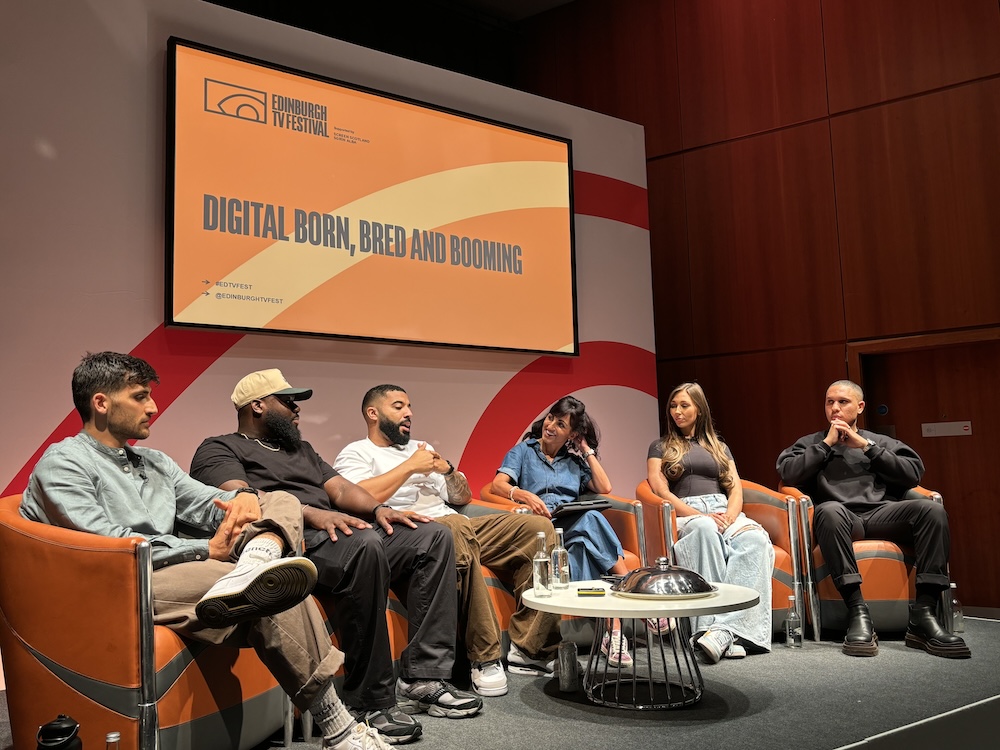The Digital Born, Bred and Booming panel session at this week’s Edinburgh TV Festival brought together some influential digital content executives to discuss their journeys, the challenges they face, and their strategies for staying relevant.
Moderated by Laura Marks, Senior Digital Commissioner at Channel 4, the session featured insights from James Duncan and Fuhad Dawodu of Shxts and Gigs, Eloise Head AKA FitWaffle, Ben Zand of Zandland, and Jordan Schwarzenberger, manager of the Sidemen. Here are our key session takeaways:
Starting Small, Growing Big
Shxts and Gigs: James and Fouhad started their podcast from a small apartment in Manchester in 2019. They emphasized the importance of consistency and passion, which led them to grow their YouTube channel to 1.9 million subscribers. Their journey highlights that success often starts with small, dedicated efforts and can scale significantly over time.
Diversification is Key
Jordan Schwarzenberger discussed the importance of diversifying revenue streams, particularly through Sidemen’s ventures like their membership platform Sidemen Plus. By building different revenue models, creators can avoid over-reliance on any single platform, which is crucial in an industry where algorithms and audience behaviour can change rapidly.
Monetising Digital Content
Eloise Head AKA FitWaffle shared that Facebook is her most lucrative platform due to its ad revenue, despite common perceptions that newer platforms like TikTok or Instagram would dominate. She highlighted the unpredictable nature of ad revenue, which can fluctuate seasonally, with higher earnings during the Christmas season.
Creators as Brands
Ben Zand emphasised the importance of treating creators and their content as brands. He explained how Zandland reinvests revenue from traditional commissions into creating digital content, which can later be sold internationally. This approach not only sustains his business but also builds a brand that can stand independently in the digital space.
The Importance of Time Management
Several panellists, including Eloise and James from Shxts and Gigs pointed out that time is their most significant challenge. As digital creators, balancing content production with personal time is tough, especially when their presence is integral to their brand’s success. This is a reminder of the intense demands placed on digital creators in maintaining consistent output.
Staying Relevant in a Crowded Market
Jordan Schwarzenberger advised production companies to adapt by distributing their content independently, much like YouTubers. He encouraged production companies to experiment with social media and build their own brands rather than relying solely on traditional TV models, which are increasingly losing their younger audiences.
Preparing for the Post-Linear Future
The panel discussed the decline of linear TV, especially among younger audiences. With statistics showing a 75% decline in TV viewership among 16-24 year-olds over the last decade, the panellists emphasized the need for production companies and creators to pivot towards digital platforms where their audiences are migrating.
Brand Collaboration and Content Ownership
Ben and Jordan both highlighted the growing role of brands as commissioners in the digital content landscape. By collaborating with brands, creators can secure funding while retaining more control over their content, allowing for greater creative freedom and potential long-term revenue from IP ownership.
Adapting to Fast-Changing Technologies
The panel stressed the importance of staying current with new digital trends and technologies. For many traditional TV producers, this means learning how to navigate platforms like TikTok, Instagram Reels, and YouTube Shorts, which demand different content strategies than those used in traditional media.
The Future of Digital Content
As digital platforms continue to evolve, the panel concluded that the future lies in creating content that can be distributed across multiple channels, building strong brands, and continually adapting to new audience behaviours and technologies.
The session underscored that success in the digital world requires more than just great content—it demands strategic diversification, consistent engagement, and a willingness to adapt to an ever-changing landscape. For creators and production companies alike, the ability to pivot and innovate is key to success.





